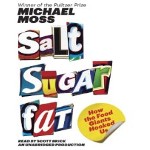 |
Scott Brick narrates SALT SUGAR
FAT by Michael Moss, a Pulitzer Prize winning
author and reporter for the New York Times. Here is the
story of how the food giants hooked Americans into consuming
more highly processed junk foods at the expense of our
health. Starting with a secret meeting between CEOs from
Kraft, General Mills, Cargill, and other conglomerates,
Moss unravels a narrative in which deception and repetitive
advertising takes precedence over moral obligation. Transforming
basic substances into nearly toxic food additives, the
kings of corn focused on manufacturing products designed
to addict and delight, irregardless of the negative consequences
on childhood obesity, diabetes, and cancer rates. As a
result, profits have soared, with sales of $1 TRILLION
per year for the industry, making it one of America's
largest. Health care costs due in part to consumption
of these products? $300,000,000,000. So that cheap burger
or soda is anything but cheap in the long run. Moss takes
each substance in turn, telling its story or part in the
bigger picture. His research is exhaustive and backed
by source notes (included in a special PDF on one of the
disks.) Most surprising? How the processors analyzed how
best to deliver their engineered molecules to light up
the pleasure centers in the brain, much like drugs. (Along
with the tests they conducted on babies.) And how they
sought out Philip Morris, a tobacco giant, to advise them
on how best to fight concerns over health. A must-hear.
As a footnote, narrator (and friend) Scott Brick contracted
throat cancer last August, but is already in recovery
due in part to a radical change in diet. |
|
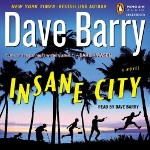 |
Dave Barry reads his often amusing new
novel INSANE
CITY, which is a zany ride to the altar for
one Seth Weinstein, a ne'er-do-well who's snagged a beautiful
lawyer (a flip of the usual plot), but gets involved in
more antics than the guys in The Hangover could imagine,
including Russian gangsters, strippers and pimps, pirates,
a python, a possible gorilla, and a group of powerful
businessmen. It's like a big wind-up toy with lots of
nutty characters (and a Haitian mother looking to make
it safely to America.) Barry takes the characters, winds
them up tight, and releases the button to see what happens.
What happens is nuts, wrapped up with a coming-of-age
denouement that reflects on life, marriage, and Miami,
among other locales. The story mostly works, but would
have been better had Dick Hill been the narrator instead
of Barry himself. As a reader, Barry is a good writer.
Meaning that, at least for his novels, Barry isn't a great
actor and should leave fiction to those who are. Like
Jim Dale, who read his Peter & the Starcatchers, or
Dick Hill, who read his Big Trouble. It's okay to read
personal memoirs, or non-fiction, but usually (albeit
not always) it is the professional actor who should read
novels, not the author. This is not to say Barry does
a poor job reading, just that others could have been better. |
|
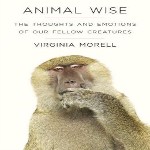 |
We humans believe we are vastly superior to animals,
while in fact there is only a 1% DNA difference between
us and chimps. Considering how violent and competitive
we are, prone to congregate into groups that fight each
other over even smaller differences, can we really use
the word "vast" anymore? In her book ANIMAL
WISE author Virginia Morell reveals
the intelligence of animals we eat for food, just as they
eat other animals for food. At the top of the food chain,
we human animals need to consider the implications and
responsibility we have in the treatment of other species,
and what our excesses bode for our own survival. Morell
is nature writer, and also author of "Wildlife Wars"
and "Ancestral Passions." Here she reveals the
results of cognitive studies done around the world in
mapping animal intelligence. The surprising conclusions
are that animals can feel emotions, and they remember.
Chimps actually grieve over loss. Birds practice songs
in their sleep. Crows improvise tools. Dogs have vocabularies.
Yet to produce cheap meat, we herd cows and chickens into
pens where they can barely move, and feed them grains
they weren't meant to eat until they get sick, then we
slaughter them. Kinda like Nazi concentration camps. This
book doesn't say this, and is not primarily about ethics.
Still, it is a reflection that's hard to avoid in the
listening. Who's the animals? We all are. Time for us
to evolve and progress past our limited understanding
of our natural world, and the impact we have on it. Narrated
with usual aplomb by Kirsten Potter, this audiobook
provides an intimate look at various animals, each chapter
covering a different species. It's a complex subject,
and scientists don't have all the answers. But we have
learned much, and there is much here that many would be
surprised to learn.
|
|
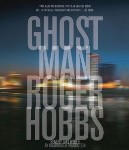 |
The flipside of the police procedural is the criminal
procedural. GHOST
MAN by Roger Hobbs is a new example of this
subset, a debut thriller about a casino heist gone wrong,
two dueling crime kingpins, and the independent "ghost"
between them, trying to understand his mistakes related
to another heist five years prior. Narrator Jack
Weber is superb both in conveying the downtempo
tone and in animating the characters with appropriate
and believable accents. If you liked The Sopranos you'll
like this book, as it shows the simplistic criminal mind
in action, always looking for shortcuts to the wallets
of "suckers" and "losers" like you
and me. As for me, I did not care for The Sopranos, however.
I always feel a queasy disgust watching or hearing about
guys who pretend their jobs are just as good as yours
while pouring drano down the throats of the innocent.
A narrative that is sympathetic to that viewpoint begs
criticism. And here the "ghost man" is never
really revealed. Jack takes risks for the adrenalin rush
of it, not for the money. For the feeling of power he
gets, which of course is an illusion. And you are expected
to accept that this is different enough. Not enough, I
say. But that's just me. So while I can't fault the writing,
and especially not the engaging narration, I do fault
the emphasis on weapons and ammo and the how-to theme
(over the motivations of the characters, who are base
and deluded rather than complex.) If these guys are so
smart, how come they don't get jobs on Wall Street and
fleece good people for many millions more than can be
gained robbing armored cars of Federal bank shipments?
|
|
Finally, narrator Cassandra Campbell is
the best reason to buy THE
LOST ART OF MIXING by Erica Bauermeister, a
followup to her "The School of Essential Ingredients."
The story is character driven, and features Lillian, a chef
and restauranteur dealing with the pressures of change and
loss, who comes to depend on the new people in her life.
Lillian runs a cooking school, and has friends who may sometimes
resemble the cast of episodes on Kitchen Nightmares,
but who must all accept change and work together to succeed.
Campbell as reader is a talented performer with an innate
sensitivity toward what motivates people, and so does much
more than merely read the words, as many self-read authors
or amateur readers do. (As mentioned above, it is my contention
that authors should not read their own novels, although
biographies and non-fiction is appropriate, and, of course,
there are a few exceptions to this rule. An example of one
whose author should not have read her novel is the recent
Scent of Darkness by Margot Berwin. A rather boring
monotone is taken which would have been transformed into
a memorable listening experience by the skills of a Campbell
or a Barbara Rosenblat. Few writers are also good actors,
nor do they apply the same techniques of story arc and fleshing
out the characters in audible format that they may have
achieved on the page.) The new Bauermeister novel has no
murders or chase scenes, and so is not "a page-turner,"
as they say. Rather, it is a reflective novel combining
the love of food with the love of company, with insights
into friendship and how to accept what life offers, which
is not merely cheap thrills. That mix, these days, is becoming
a lost art. |
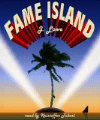 If
you liked the movie ARGO, you will like Fame
Island, narrated by Emmy winning actor Kristoffer Tabori.
Like Argo, there is a hostage rescue, a crew pretending
to be Hollywood producers in order to gain access to a corrupt
regime, and it is partly based on a true story. In addition,
George Clooney, one of Argo's producers, has a
cameo role in the audiobook. If
you liked the movie ARGO, you will like Fame
Island, narrated by Emmy winning actor Kristoffer Tabori.
Like Argo, there is a hostage rescue, a crew pretending
to be Hollywood producers in order to gain access to a corrupt
regime, and it is partly based on a true story. In addition,
George Clooney, one of Argo's producers, has a
cameo role in the audiobook. |
|